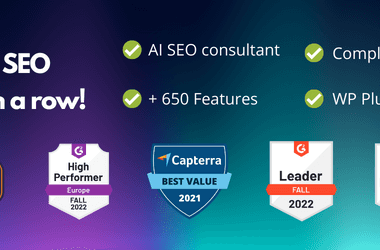Updated: Jan 02, 2024 By: Dessign Team
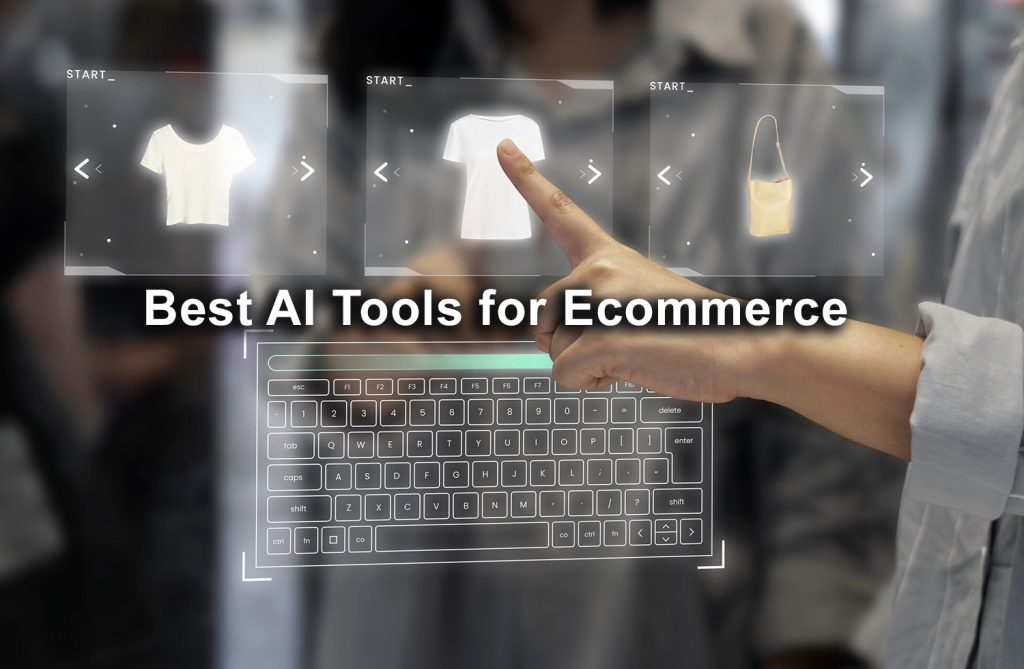
If you're looking to take your ecommerce business to the next level, incorporating AI tools is the way to go. These powerful artificial intelligence solutions offer a wide range of features and benefits that can revolutionize your operations.
AI tools have become essential for ecommerce businesses looking to upgrade their operations. These tools offer various features and benefits that can save time, increase efficiency, and drive more sales. Some of the best AI tools for ecommerce include Clerk.io, Vue.ai, Albert AI, Symphony Retail AI, and Optimizely Web Experimentation.
These tools help with tasks such as personalization, content creation, pricing optimization, fraud management, and more. By utilizing AI tools, ecommerce businesses can enhance their customer experience, improve conversion rates, and stay ahead of the competition.
1. Clerk.io
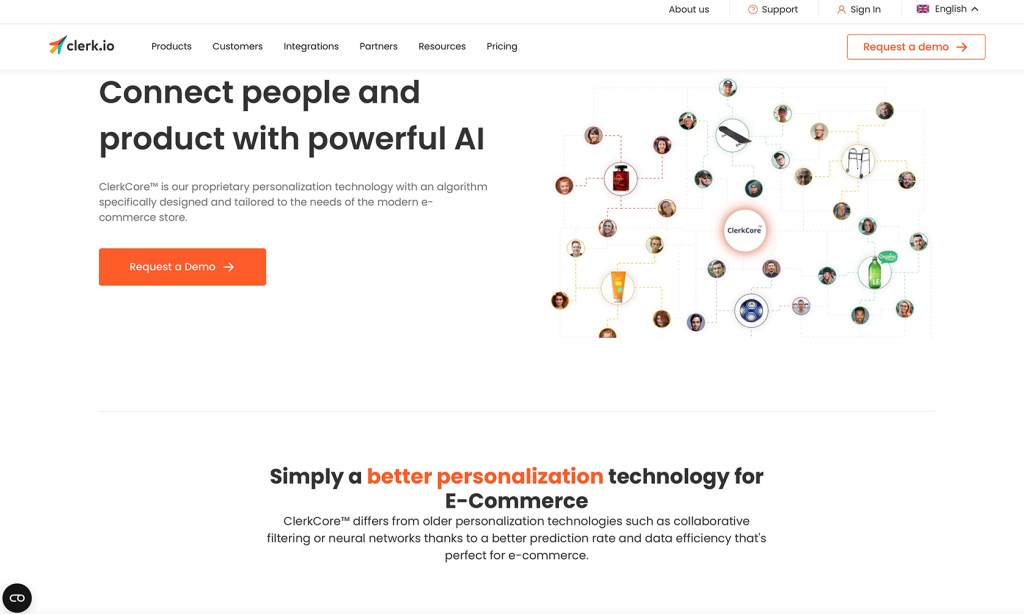
Clerk.io is an AI-powered platform that helps ecommerce businesses increase conversions and revenue through personalized product recommendations. It uses advanced algorithms to analyze customer behavior and product information to deliver tailored recommendations in real-time across the customer journey. Key features include personalized homepages, product suggestions, email recommendations, and cart abandonment recovery.
Clerk.io integrates seamlessly with popular ecommerce platforms like Shopify and WooCommerce. It is known for its easy setup and use, requiring no engineering resources. Overall, Clerk.io leverages the power of AI and machine learning to help ecommerce retailers boost sales through highly relevant recommendations customized for each shopper.
Key Features:
- Live chat, email, and messaging support
- Conversational commerce to engage customers
- Automated conversations with natural language processing
- Integration with popular ecommerce platforms
Pros:
- Increases sales with conversational commerce
- Provides 24/7 automated support
- Reduces customer support costs
- Delivers personalized shopping assistance
Cons:
- Can be pricey for small businesses
- Limited customization options
- Relies heavily on automated conversations
2. Vue.ai
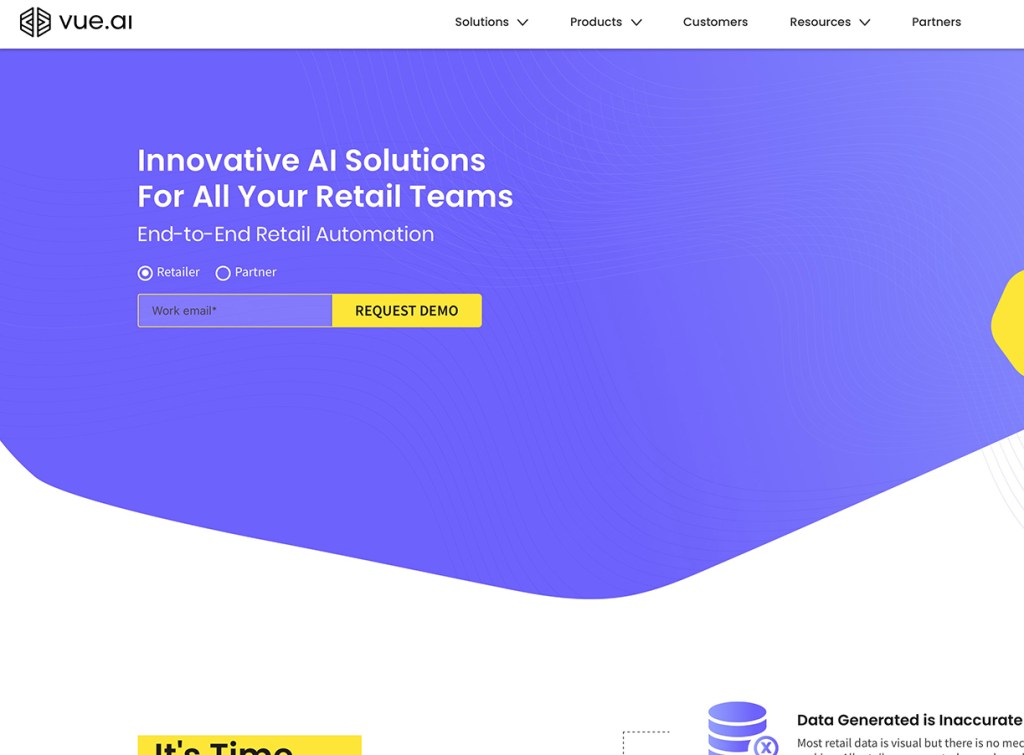
Vue.ai is an AI-driven platform for automating fashion catalog operations like product tagging, search, discovery, and recommendations. It utilizes computer vision and deep learning to digitize fashion assets, extract detailed product data, and generate relevant tags and descriptions.
Key capabilities include bulk image auto-tagging, identifying products attributes like color and pattern, searching catalog by image, discovering visually similar items, and recommending complementary products.
Vue.ai aims to save fashion retailers significant time and resources spent on manual tasks. It integrates with ecommerce platforms like Shopify and Magento. Vue.ai reduces catalog management costs, optimizes discovery, and provides a superior shopping experience by tapping into AI and machine learning.
Key Features:
- Automated image tagging and search engine optimization
- Background removal and image enhancement
- Virtual photoshoot generator with models
- Personalized product recommendations
Pros:
- Improves product discoverability
- Reduces costs of hiring photographers
- Increases click-through rates with enhanced images
- Provides visually appealing product views
Cons:
- Limited style and model options for photoshoot generator
- Image editing lacks manual customization
- Doesn't integrate with all ecommerce platforms
3. Albert.ai

Albert AI is a leading AI-as-a-service platform focused on natural language processing and generation. It enables developers to easily integrate powerful NLP and NLG capabilities into their applications and workflows.
Core features include text classification, named entity recognition, sentiment analysis, summarization, content moderation, translations, conversational AI and more. Albert AI offers pre-trained models so developers can get started quickly without data science expertise. It provides simple API access and SDKs for various programming languages.
With Albert AI, developers can build intelligent chatbots, analyze customer feedback, moderate content, generate natural language text and more. It aims to democratize access to enterprise-level NLP/NLG intelligence through its highly scalable cloud platform.
Key Features:
- Predictive recommendations based on AI
- Dynamic pricing and promotion optimization
- Inventory forecasting and replenishment
- Customer segmentation for targeted campaigns
Pros:
- Drives higher conversion rates with targeted campaigns
- Increases average order value through recommendations
- Reduces overstocking and understocking with forecasts
- Provides insights into highest-value customers
Cons:
- Expensive for smaller ecommerce retailers
- Setup and training is time intensive
- Forecasting accuracy depends heavily on data quality
4. Symphony Retail ai
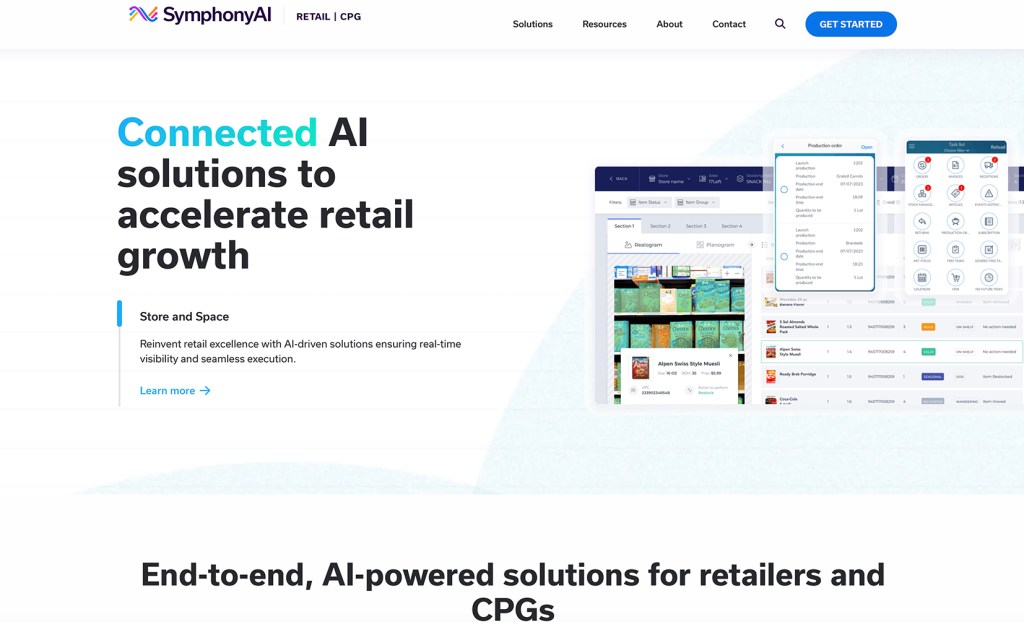
Symphony Retail AI is an AI-based platform for predictive insights in the retail industry. It applies machine learning and natural language processing to generate personalized recommendations and timely interventions that can increase sales and improve customer experience.
Capabilities span price optimization, promotion planning, inventory management, customer engagement and more. Symphony RetailAI integrates data from across stores, ecommerce and other sources to fuel accurate forecasts and prescriptive recommendations. It provides role-based insights to users through easy-to-use dashboards and alerts.
Leading retail brands like Coca-Cola, Petco and PepsiCo leverage Symphony RetailAI's AI-driven innovations to maximize revenue opportunities, minimize losses and boost customer loyalty. Overall, it enables data-driven decision making powered by AI to transform retail operations.
Key Features:
- Demand forecasting and inventory planning
- Personalized promotions and markdown optimization
- Supply chain visibility and efficiency
- Automated floor planning and space optimization
Pros:
- Reduces excess inventory and stockouts
- Increases sales and margins with pricing optimization
- Improves efficiency across retail operations
- Enables data-driven store planning
Cons:
- Requires large volumes of historical data
- Lacks flexibility for fast-changing retail environments
- Expensive solution aimed at large retailers
- Heavy reliance on AI limits user control
5. Optimizely Web Experimentation
Optimizely Web Experimentation enables A/B testing and controlled experimentation on websites and mobile apps through its AI-powered platform. It provides an intuitive visual interface to set up, run and analyze experiments without coding.
Users can test variations of headlines, page layouts, calls-to-action and more to optimize conversion rates. Optimizely applies statistical modeling to account for confounding factors and ensure winning variations are scientifically valid. It offers advanced AI capabilities like predictive prioritization to automatically identify the most promising experiments.
Leading brands like Microsoft, Disney and The Wall Street Journal leverage Optimizely to drive data-informed design choices. Overall, Optimizely Web Experimentation makes experimentation simple and accessible to optimize customer experience.
Key Features:
- A/B testing and multivariate testing
- AI-powered personalization engine
- Automated experimentation
- Integration with data platforms
Pros:
- Improves conversion rates through testing
- Increases revenue with personalized experiences
- Reduces time spent setting up tests
- Provides detailed performance insights
Cons:
- Can take time to set up and tune properly
- Ongoing management of tests is required
- Personalization is limited to web experiences
- Additional fees for advanced features
Enhancing Conversion Rates with AI-Powered Tools
Increasing conversion rates is a top priority for ecommerce businesses, and AI-powered tools can be a game-changer in achieving this objective. By utilizing AI-driven optimization techniques and leveraging tools like Optimizely Web Experimentation, you can identify and implement data-backed strategies to boost conversions.
One of the key advantages of AI-powered tools is their ability to analyze vast amounts of data in real-time and provide actionable insights. These tools can help you understand customer behavior, preferences, and pain points, allowing you to tailor your website and marketing efforts accordingly. With Optimizely Web Experimentation, for example, you can conduct A/B tests to determine the most effective design, layout, and messaging that resonates with your target audience.
Another way AI tools can enhance conversion rates is through personalized recommendations. By analyzing customer data and purchase history, AI-powered tools can suggest relevant products or services that are more likely to appeal to individual customers. This level of personalization not only improves the customer experience but also increases the chances of conversion.
| AI Tools for Ecommerce Conversion Optimization | Features |
|---|---|
| Optimizely Web Experimentation | Allows A/B testing and data-driven optimization |
| Clerk.io | Enables intelligent product recommendations and personalized search results |
| Vue.ai | Offers visual search and personalized styling recommendations |
Moreover, AI-powered chatbots can play a crucial role in improving conversion rates. These chatbots can provide personalized assistance, answer customer queries, and guide them through the purchase process. By ensuring a seamless customer experience, AI chatbots can help reduce friction and increase the likelihood of completing a sale.
In conclusion, AI-powered tools have revolutionized conversion optimization for ecommerce businesses. By leveraging the capabilities of AI, you can analyze data, implement personalized recommendations, and utilize AI chatbots to enhance the customer experience and drive more conversions. As the ecommerce landscape continues to evolve, investing in AI tools is increasingly important to stay competitive and achieve sustainable growth.
Leveraging AI for Ecommerce Analytics and Insights
Data is a goldmine for ecommerce businesses, and AI tools can unlock its full potential. By utilizing ecommerce analytics tools like Symphony Retail AI and harnessing the power of AI for data analysis, you can gain valuable insights that drive strategic decision-making and business growth.
With Symphony Retail AI, you can dive deep into your ecommerce data to discover trends, patterns, and correlations that may have otherwise gone unnoticed. This powerful tool uses advanced algorithms to extract actionable insights from large datasets, providing you with a competitive edge in the market.
One of the key advantages of Symphony Retail AI is its ability to generate accurate sales forecasts. By analyzing historical sales data and combining it with real-time market trends, this tool can help you optimize inventory management, reduce stockouts, and maximize sales potential.
In addition to sales forecasting, Symphony Retail AI can also help you understand customer behavior and preferences. By analyzing data on customer demographics, purchase history, and browsing patterns, you can personalize marketing campaigns, improve customer retention, and drive customer loyalty.
| Benefits of Symphony Retail AI for Ecommerce Analytics |
|---|
| Accurate sales forecasting |
| Improved inventory management |
| Enhanced personalization and customer retention |
In conclusion, Symphony Retail AI is a powerful AI tool that can revolutionize your ecommerce analytics and insights. By leveraging the capabilities of AI for data analysis, you can unlock the full potential of your data, make informed business decisions, and stay ahead of the competition in the ever-evolving ecommerce landscape.
Improving Ecommerce Operations with AI Tools
Running an ecommerce business involves handling numerous operations, and AI tools can be instrumental in improving efficiency and effectiveness. Ecommerce automation tools like Apptus eSales can automate repetitive tasks, optimize inventory management, and ensure seamless fulfillment, allowing you to focus on growing your business.
Implementing Apptus eSales can significantly streamline your operations by automating manual processes. With its advanced algorithms, this tool can analyze customer behavior, predict demand, and optimize product recommendations. By automatically updating pricing and inventory levels, you can avoid stockouts and optimize profitability.
Apptus eSales provides real-time insights and actionable data, allowing you to make informed decisions to drive business growth. Its intelligent search capabilities enhance the customer experience, ensuring relevant search results and increasing conversions. Additionally, this tool can help you identify and address potential bottlenecks in your fulfillment process, ensuring timely and accurate order processing.
| Benefits of Apptus eSales: |
|---|
| Automates repetitive tasks |
| Optimizes inventory management |
| Ensures seamless fulfillment |
| Provides real-time insights |
| Enhances customer experience |
By leveraging the power of AI tools like Apptus eSales, you can streamline your ecommerce operations, improve efficiency, and deliver an exceptional customer experience. Investing in these tools allows you to stay ahead of the competition, drive more sales, and achieve sustainable business growth.
Conclusion
AI tools have become indispensable for ecommerce businesses, offering a multitude of benefits that can transform your operations and drive success. By leveraging the power of AI in personalization, optimization, content creation, and more, you can elevate your ecommerce business and outshine the competition.
These tools, including Clerk.io, Vue.ai, Albert AI, Symphony Retail AI, Optimizely Web Experimentation, provide solutions for various aspects of your ecommerce business. They can enhance customer experience, improve conversion rates, and optimize pricing strategies.
With AI-powered personalization tools, you can offer tailored recommendations, personalized customer service through chatbots, and create individualized shopping experiences. AI-driven content creation tools like Writerly.ai make it easier to generate engaging and high-quality content efficiently.
Furthermore, AI tools can optimize your sales and pricing strategies, streamline operations, detect and prevent fraudulent activities, and boost marketing efforts. By leveraging these tools, you can make data-driven decisions, improve efficiency, and ultimately drive more sales for your ecommerce business.
FAQ
What are AI tools for ecommerce?
AI tools for ecommerce are software applications that utilize artificial intelligence technology to enhance various aspects of an ecommerce business, such as personalization, content creation, pricing optimization, fraud management, and more.
Why are AI tools important for an ecommerce business?
AI tools are important for an ecommerce business because they can save time, increase efficiency, and drive more sales. These tools offer features and benefits that can enhance the customer experience, improve conversion rates, and help businesses stay ahead of the competition.
What are some of the best AI tools for ecommerce?
Some of the best AI tools for ecommerce include Clerk.io, Vue.ai, Albert AI, Symphony Retail AI, Optimizely Web Experimentation, AdRoll, Apptus eSales, Tweetify.it, Writerly.ai, Frase, Neural Love, Deep Dream, and Descript. These tools offer a wide range of functionalities to cater to different needs of ecommerce businesses.
How can AI tools enhance personalization for ecommerce?
AI tools can enhance personalization for ecommerce by utilizing AI chatbots to provide seamless customer service experiences. These tools can also leverage AI-driven personalization techniques to improve customer engagement and increase conversions.
How can AI tools optimize sales and pricing for ecommerce?
AI tools can optimize sales and pricing for ecommerce by automating processes and improving efficiency. They can also employ AI-powered pricing optimization techniques to help businesses find the optimal price points for maximum profitability.
How can AI tools streamline content creation for ecommerce?
AI tools can streamline content creation for ecommerce by utilizing ecommerce analytics tools to gather valuable insights and make data-driven content decisions. Tools like Writerly.ai can also assist in generating high-quality content efficiently.
How can AI tools enhance the customer experience in ecommerce?
AI tools can enhance the customer experience in ecommerce by analyzing customer data and gaining valuable insights to personalize marketing efforts. AI chatbots can also provide personalized and prompt customer support.
How can AI tools improve fraud management in ecommerce?
AI tools can improve fraud management in ecommerce by using AI-based solutions like Albert AI to detect and prevent fraudulent activities. These tools help protect both the business and its customers from potential threats.
How can AI-powered tools enhance conversion rates in ecommerce?
AI-powered tools can enhance conversion rates in ecommerce by utilizing AI-driven optimization techniques. Tools like Optimizely Web Experimentation can help identify and address potential barriers to conversion, ultimately improving conversion rates.
How can AI be leveraged for ecommerce analytics and insights?
AI can be leveraged for ecommerce analytics and gaining valuable insights by using tools like Symphony Retail AI. These tools enable businesses to analyze data and make informed decisions based on hidden patterns and trends in customer behavior.
How can AI tools boost marketing efforts for ecommerce?
AI tools can boost marketing efforts for ecommerce by optimizing advertising campaigns and reaching the target audience effectively. Tools like AdRoll and Tweetify.it offer features to personalize marketing efforts and improve return on investment.
How can AI tools improve overall ecommerce operations?
AI tools can improve overall ecommerce operations by automating processes and increasing efficiency. Tools like Apptus eSales can optimize inventory management and fulfillment, ensuring smooth operations.
Which AI-powered content tools can unleash creativity for ecommerce businesses?
AI-powered content tools like Writerly.ai, Frase, Neural Love, Deep Dream, and Descript can unleash creativity for ecommerce businesses by generating compelling content and visuals.

